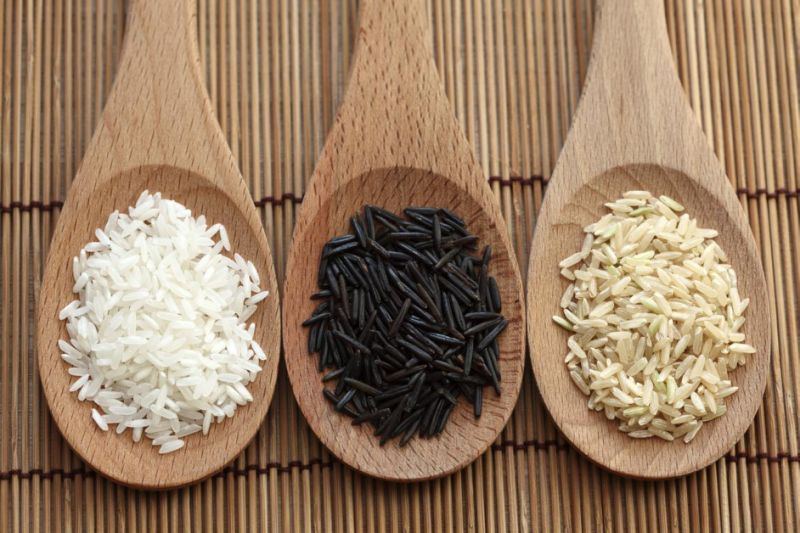There are many reasons why people choose to eat a gluten free diet. Those with celiac disease, wheat allergies, or other non-celiac gluten sensitivities avoid many or all gluten products. Nearly 1 in 140 people have celiac disease and close to 6 percent of people have a non-celiac gluten sensitivity. Additional conditions like eosinophilic esophagitis which is an immune disease triggered by an allergy to wheat in many people can also be a reason for going gluten free. With all these conditions, it is no wonder why gluten products are avoided, but as one of the most consumed types of products, you might be wondering just if you should be avoiding rice. Is rice gluten free or can people with these various gluten intolerances safely consume rice? Read on to learn more.

Does Rice Contain Gluten?
In its natural form, rice is gluten free. Whether it is brown rice, wild rice or even white rice, they are all free of gluten. Even sticky rice, a popular Asian rice that is also referred to as glutinous rice, does not contain gluten. This sticky rice is only called “glutinous" because of the sticky consistency of the rice and not because it contains gluten protein. Rice actually can have some beneficial nutritional values. Below is what you'll want to know about the different types of rice you can eat.
Brown rice. Brown rice contains selenium, manganese and is an excellent source of fiber. Brown rice tends to have more texture to it since it is unrefined and will contain germ and bran in it which is removed from white rice when it is processed. To keep brown rice fresh, store it, uncooked, in an airtight container or in the refrigerator.
White rice. White rice doesn't have much nutritional value. While it is one of the most popular types of rice to consume, most of the nutrients are stripped from it when it is processed. This is why white rice will have a smoother texture and can last long that other types of rice.
Wild rice. Is rice gluten free if it is wild rice? Wild rice is actually a grass and not really rice at all, but it is still gluten free. Wild rice tends to be more expensive than brown or white rice because it is more difficult to grow. There are plenty of vitamin and minerals in wild rice, like folate, vitamin B6, and fiber. Wild rice also contains a significant amount of antioxidants.
Some rice, however, may not be gluten free. Rice is naturally gluten free but when it is growing or being harvest, it may come in contact with barley, rye or wheat, which do contain gluten. Always buy rice that is certified as gluten free and never purchase rice in bulk from grocery store bins as these increases the chance of cross contamination.
Additionally, some rices will be made with sauces or other spices that can contain gluten. Just because something has “rice” on the label doesn't mean it is actually rice. Rice pilaf is actually made with orzo and is not gluten free. So when purchasing rice, look at the ingredients label before you buy it so you know it is really gluten free. It is better to simply avoid any rice products you are unsure about until you can be certain it does not contain gluten.
Is rice gluten free at restaurants? While the rice may be gluten free, the other ingredients added may not be. So when eating out, make sure you know all the ingredients in the rice dish before you order it. Never be afraid to ask if your rice can be made in a clean pan to avoid any contact with other gluten products.
What Are the Safe Brands of Rice to Choose?
Lumberg Family Farms
This company offers a wide range of different types of rice, flavors and rice mixes. Their products are specifically geared towards those who want gluten free products. Since they only offer rice products, you do not have to worry about the rice being cross contaminated.
Alter Eco
This company offers a few more exotic types of rice like Khao Deng Ruby Rice, Hom Mali Jasmine Rice and Thai Sticky Purple Rice that are gluten free. They take special care to ensure the rice does not come in contact with other gluten products while farming the rice and during the production phase.
Thailand Rice
If the other two options are not available to you, look specifically for rice that is grown in Thailand. Thailand doesn't grow much wheat so it is less likely that the rice grown there will contain any gluten.
Are There Any Alternative Gluten Free Grains?
While rice is gluten free and has healthy benefits, you want to consider adding in other grains that are gluten free to your diet. Besides, rice does contain arsenic which is a naturally chemical found in nature so consuming large amounts of rice can be unhealthy because of the arsenic consumption. While is rice gluten free may not be a concern for those without celiac disease, the amount of arsenic they consume may be. However, since those with celiac disease tend to eat much more rice, they are more likely to suffer from the dangerous effects of consuming too much arsenic. So consider eating the following products instead of rice.
Quinoa
Corn
Millet
Beans
Lentils

View All Comments /Add Comment